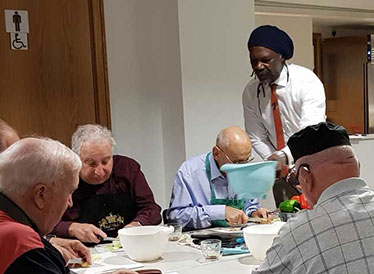"I think a lot of it is as a result of men not thinking about it soon enough,” says 87-year-old Brian, of loneliness. “A lot of older men just go into retirement and they’re not really prepared for it.”
Brian’s one of more than 100 men over the age of 65 who’ve shared their views on what it means to be lonely with researchers from the University of Bristol. And while conversations about loneliness and social isolation have become more commonplace thanks to well-publicised initiatives such as the Jo Cox Commission on Loneliness, Brian and other older men like him haven’t been as quick to talk – until now.
“Older men are much less likely to tell someone when they’re feeling lonely than older women are,” says Susan Davidson, Research Manager at Age UK. “But that doesn’t mean men aren’t experiencing similar feelings. It just means they aren’t expressing how they feel in the same ways.”
Speaking to the seldom heard
With support from Age UK, researchers from the University of Bristol, led by Dr Paul Willis, embarked on a two-year study with older men who’ve felt lonely or isolated to find out how they dealt with it, and what kind of support helped them to feel less lonely.
"There are a variety of reasons why men feel socially isolated," says Paul. "Some of them are cultural – some men may feel embarrassed about asking for help – while others may have relied on partners for maintaining social networks. Other causes may be more practical, like struggling to find groups or activities that fit their needs or interests."
The study, entitled Older Men at the Margins, focused on ‘seldom-heard’ groups of men:
- Men who are heterosexual and single or living alone.
- Men who are gay and single or living alone.
- Men who live in rural areas.
- Men who are caring for a significant other.
- Men living with hearing loss.
Lonely in a crowd
The Older Men at the Margins project explored the formal and informal ways these men sought to stay connected with others and feel less lonely – in particular the role of group activities.
“While being part of groups can be really helpful for older men, we know that many struggle to access social support because they feel clubs and activities for older people are mainly for women,” explains Paul. “They also tell us there’s a lack of activities that interest them, and a lack of male staff running services.”
Finding groups where the men felt they could be themselves, engage in activities they found interesting and, crucially, where they could feel a sense of renewed purpose by contributing to the running and organisation of the group, were key to the men interviewed.
“It’s much better to give than to take,” says study participant Andrew, 68. “So if you can go and do something for someone else… it makes you feel a great deal better.”
Ideas for older men on how to beat loneliness and isolation
The men we spoke to through the research had lots of tips for how they tackle feeling lonely and isolated. This leaflet captures their suggestions.
How Age UK is combatting loneliness in older men
“This has been a fascinating study to support,” says Susan Davidson. “Based on what we’ve learned from Older Men at the Margins, we've written resources which we hope will be helpful for both older men themselves and people who work with older men.”
Many local Age UKs are already taking steps to tackle social isolation in men in their communities. For instance, Age UK Barnet runs a regular cookery class for men who want to improve their skills in later life – and recently hosted a celebrity chef to teach the group a new recipe.
Other initiatives include Men in Sheds, community wood-working projects for men; 75-year-old John is involved with a similar initiative near him.
“You can just come along, have a cup of tea and a biscuit and have a chat and a bit of a leg-pull – stuff like that,” explains John. “It’s not just about making things. It’s about companionship, friendship – and most of all it’s fun!”
Find out more about Older Men at the Margins
Videos, interviews with older men and resources on loneliness.
Further information: The Older Men in the Margins (OMAM) project was based at the School for Policy Studies, University of Bristol in collaboration with Age UK, 2016-2019. This resource summarises independent research funded by the National Institute for Health Research School for Social Care Research. The views expressed in this document are those of the author(s) and not necessarily those of the NIHR SSCR, the National Institute for Health Research or the Department of Health and Social Care.


